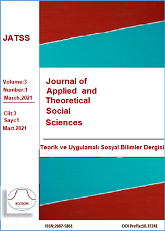The Relationship Between Inflation, Budget Deficit and Tax Revenues: The Case Of Turkey
Abstract
Nowadays, budget deficits and inflation are among the most important macroeconomic problems of countries. It is also thought that tax revenues, which constitute a source of public service provision, should be analyzed in the context of inflation and budget deficits. For this purpose, the relationship between inflation, budget deficits and tax revenues has been tried to be determined. In this context, impulse response analysis and variance decomposition calculation based on VAR model were used. The study is based on monthly time series analysis for the period 2000-2018. The mentioned data set was obtained from the Central Bank's EVDS data bank. As a result, it has been determined that there is a mutual interaction between inflation, tax revenues and budget deficits.
Metrics
References
Abdioğlu, Z., Terzi, H. (2009), “Enflasyon ve Bütçe Açıkları İlişkisi: Tanzi ve Patinkin Etkisi”, Atatürk Üniversitesi İktisadi ve İdari Bilimler Dergisi, 23:2, 195-211.
Anusic, Z. (1994), “Budget Deficit and Inflation”, Croatian Economic Survey, 21-36.
Alper, F. Ö. (2018), “Türkiye’de Bütçe Açığı, Para Arzı ve Enflasyon Arasındaki İlişkinin İncelenmesi: 1971-2016 Business and Dönemi”, Economics Research Journal, 9:4, 799‐810. DOI: https://doi.org/10.20409/berj.2018.139
Altunöz, U. (2018), “Enflasyon ve Bütçe Açıkları Arasındaki İlişki Bağlamında Olivera-
Tanzi ve Patinkin Etkisinin Türkiye’de Geçerliliği”, Vergi Dünyası Dergisi, 438, 21-33.
Ataç, B. (2016) Maliye Politikası, Ankara: Turhan Kitabevi.
Bayır, M., Güvenoğlu, H. (2020), “The Analysıs of Relatıonshıp Between The Money Supply, Budget Deficit And Inflation in Turkey: 2009-2019”, ICOAEF’20,VII International Conference on Applied Economics and Finance & EXTENDED WITH SOCIAL SCIENCES), 186-197.
Bayrak, M. ve Kanca, O. (2013), “Türkiye’de Kamu Kesimi Açıklarının Nedenleri ve Fiyatlar Genel Düzeyi Üzerindeki Etkileri”, İ.Ü. Siyasal Bilgiler Fakültesi Dergisi, 48:1, 91-111.
Bedir, S., Tural, A. (2014), “Bütçe Açığı ve Enflasyon: Türkiye İçin Bir Sınır Testi Yaklaşımı”, International Conference on Eurasian Economies, 915 , 1-9.
Beşer, M. K. (2007). Boostrapt VAR modeller ve Türkiye’de Tanzi etkisi. Zonguldak Karaelmas Üniversitesi Sosyal Bilimler Dergisi, 3(6), 89- 108.
Çavuşoğlu, T. (2005). Vergi gelirleri ve kamu harcamaları açısından enflasyon: Tanzi ve ters Tanzi etkileri. Gazi Üniversitesi İktisadi ve İdari Bilimler Fakültesi Dergisi, 7(3), 35-52.
Chukwuani, V. N., Egiyi, M. A. (2020), “Nexus between Budget Deficit and Inflation: Granger-Causality Test Approach”, International Journal of Academic Accounting, Finance & Management Research (IJAAFMR), 4:10, 19-23.
Dinler, Z. (2019), İktisada Giriş, Bursa: Ekin Basım Yayım Dağıtım.
Edizdoğan, N., Çetinkaya, Ö. (2019), Kamu Bütçesi, Bursa: Ekin Basım Yayım Dağıtım.
Erdem, M.; Şenyüz, D.; Tatlıoğlu, İ. (2012), Kamu Maliyesi, Bursa: Ekin Basım Yayım Dağıtım.
Erdil Şahin, B. (2019), “Analysis of The Relationship Between Inflation, Budget Deficit and Money Supply in Turkey by ARDL Approach: 1980-2017”, Journal of Life Economics, 6:3, 297-306. DOI: https://doi.org/10.15637/jlecon.6.018
Erdoğan, S. ve Erdoğan, A. (2018). Türkiye’de Tanzi ve Patinkin etkilerinin VAR yöntemiyle analizi (2006 – 2017). Aksaray Üniversitesi İktisadi ve İdari Bilimler Fakültesi Dergisi, 10(1), 1-10. DOI: https://doi.org/10.25287/ohuiibf.319259
Erkam, S., Çetinkaya, M. (2014), “Budget Deficits and Inflation: Evidence from Turkey”, The Macrotheme Review 3:8, 12-22.
Feyzioğlu, B. (1997), İktidar Virüsü (Ülke Sorunlarının Saydam Analizi), İstanbul: Çağdaş.
Georgantopoulos, A. G.; Tsamis, A. D. (2011), “The Macroeconomic Effects of Budget Deficits in Greece: A VAR-VECM Approach”, International Research Journal of Finance and Economics, 79, 156-166.
Ishaq, T., Mohsin, H. M. (2015), “Deficits and inflation; Are monetary and financial institutions worthy to consider or not?”, Borsa İstanbul Review, 15:3, 180-191. DOI: https://doi.org/10.1016/j.bir.2015.03.002
İpek, E., Akar, S. (2016), “Bütçe Açığı ve Enflasyon Arasındaki İlişki: Türkiye için Ampirik Bir Analiz”, Marmara Üniversitesi İktisadi ve İdari Bilimler Dergisi, 38:2, 167-189. DOI: https://doi.org/10.14780/muiibd.281393
Kaya, M., Öz, E. (2016), “Enflasyon, Bütçe Açığı ve Para Arzı İlişkisinin Türkiye Ekonomisi Açısından Değerlendirilmesi: 1980-2014 Dönemi”, Yönetim ve Ekonomi: Celal Bayar Üniversitesi İktisadi ve İdari Bilimler Fakültesi Dergisi, 23:3, 639-651. DOI: https://doi.org/10.18657/yonveek.281800
Kazdaglı, Hüseyin (1996), "Türkiye Cumhuriyeti Merkez Bankası'nın Kuruluş Tarihçesi ve 1934- 1938 Dönemindeki Para Politikasının VAR Yöntemiyle Analizi," Hacettepe Üniversitesi Iktisadi ve Idari Bilimler Fakü/tesi Dergisi, Cilt.14, SaYl,2: 35-52.
Lozano, I. (2008), “Budget Deficit, Money Growth and Inflation: Evidence from the Colombian Case”, Borradores de Economia, No:537, 1-24.
Oktayer, A. (2010), “Türkiye’de Bütçe Açığı, Para Arzı ve Enflasyon İlişkisi”, Maliye Dergisi, Sayı: 158, 431-447.
Olivera, J.H.G. (1967), ‘Money, Prices and Fiscal Lags: A Note on the Dynamics of Inflation’, Banca nazionale del lavaro, Vol: 20, September 1967.
Oruç, E. (2016), “Bütçe Açıkları Enflasyonist Etkiye Sahip Midir? Türkiye Üzerine Uzun Dönemli Analiz”, AİBÜ Sosyal Bilimler Enstitüsü Dergisi, 16:1, 1-21. DOI: https://doi.org/10.11616/basbed.vi.455743
ÖZGEN, F.B., GÜLOĞLU, B., “Türkiye’de İç Borçların İktisadi Etkilerinin VAR Tekniğiyle Analizi”, METU Studies in Development, s. 101-103, 31 (Haziran), 2004.
Özbilen, Ş. (1999) Maliye Politikası, Bursa: Ezgi Kitabevi.
Patience, A. I., Augustine, O. O. (2008), Deficit Financing and its Inflationary Impact on Developing Economies: Nigerian Economy in Perspective, Journal of Financial Management and Analysis, 21:1, 58-68.
Pınar, A. (2017) Maliye Politikası, Ankara: Turhan Kitabevi.
Sağlam, M., Uğurlu, E. (2013), “Kamu Açıkları, Parasal Büyüme ve Enflasyon İlişkisi: Türkiye Örneği (1983-2008)”, Finans Politik ve Ekonomik Yorumlar, 50:576, 71-83.
Samirkaş, M. (2014), “Effects of Budget Deficits on Inflation, Economic Growth and Interest Rates: Applications of Turkey in 1980-2013 Period”, Journal of Economics and Development Studies, 2: 4, 203-210. DOI: https://doi.org/10.15640/jeds.v2n4a14
Solomon, M., Wet, W. A. (2004), “The Effect of a Budget Deficit on Inflation: The Case of Tanzania”, South African Journal of Economic and Management Science, 7:1, 100-116. DOI: https://doi.org/10.4102/sajems.v7i1.1431
Tiwari, A. K., Bolat, S.; Koçbulut, Ö. (2015), “Revisit the Budget Deficits and Inflation: Evidence fromTime and Frequency Domain Analyses”, Theoretical Economics Letters, 5, 357-369. DOI: https://doi.org/10.4236/tel.2015.53041
Somel, C. (2014) Makro İktisada Giriş, İstanbul: Yordam Kitap.
Şener, O. (2016) Kamu Ekonomisi, İstanbul: Beta Basım.
Tanzi, V. (1978), ‘Inflation, Real Tax Revenue, and the Case for Inflationary Finance: Theory with an Application to Argentina’, IMF Staff Papers, Vol:25, pp.417-451 DOI: https://doi.org/10.2307/3866679
Zonuzi, J. M., Pourvaladi, M. S. H.; Faraji, N. (2011), “The Relationship between Budget Deficit and Inflation






















